FoTL public talks, March-November 2019
Tuesday 12 March 2019 at 5.30pm: Dr Philip Temple
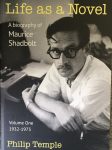 Philip Temple, of Dunedin, gave an excellent outline of his new biography, Life as a Novel: A biography of Maurice Shadbolt, Vol One 1932-1973, published by David Ling (2018).
Philip Temple, of Dunedin, gave an excellent outline of his new biography, Life as a Novel: A biography of Maurice Shadbolt, Vol One 1932-1973, published by David Ling (2018).
Philip is an award-winning author of ten novels and more than 30 non-fiction books for adults and children, including Beak of the Moon and A Sort of Conscience. He was the recipient of the 2003 CNZ Berlin Writers’ Residency and has also been a Katherine Mansfield Fellow, a Robert Burns Fellow and a National Library Fellow.
— — — — — — — — — —
Tuesday 9 April 2019 at 5.30pm: Gavin Pascoe
Gavin Pascoe is a Librarian and founder of the Wellington Classic Yacht Trust. His topic was “Alexander Turnbull – a sporting life“. Gavin described Alex Turnbull arriving back in New Zealand in 1892 as a young mercantile gentleman. One of the first things he did, as was the custom, was to organise his sporting and club interests. For Turnbull, this took the shape of yachting. He brought to yachting the same total involvement – to the point of obsession – as he did his book collecting. Turnbull helped shape the sport from its earliest days, and the foundations he laid with others fostered the culture of excellence New Zealand has today. He was a member and administrator for four boating clubs (founder of two of these), and owned three racing vessels between 1893-1908. The only place you will see Turnbull enjoying himself is when boating, and it is through the sport that we can glimpse the reputedly short-tempered, private man as a person engaged, adventurous, and laughing.
— — — — — — — — — —
Thursday 16 May 2019 at 5.30pm: Adrian Humphris
Adrian Humphris, Wellington City Archivist, presented a fascinating talk on William Turnbull (1868-1941): architect of the house built for Alexander Turnbull in Bowen Street. William Turnbull entered the architectural office of his father Thomas (1825-1907) in 1882, and received a professional education from him. In 1890, William visited Melbourne and Sydney and was engaged in the office of J A Gordon, a Melbourne architect who at that time was engaged in the design of several major commercial buildings including the Melbourne (now Victoria) Markets.
In 1891 William returned to Wellington and was admitted into partnership in the firm of Thomas Turnbull and Son. This was one of the foremost architectural practices in the city at the turn of the century and it continued after Thomas Turnbull’s death in 1907.
— — — — — — — — — —
Thursday 13 June 2019 at 5.30pm: Dr William Cottrell
“Patterns: The Printed Image and a Century of Colonial-Made Furniture”. Dr William Cottrell is an art historian specialising in colonial furniture, and the award-winning author of Furniture of the New Zealand Colonial Era (1830-1900) in 2006.

He said that new research now reveals a formerly unrecognised art history of material culture. His presentation examined the influence of printed patterns over one hundred years of colonial furniture design. He discussed three aspects of pattern production that influenced colonial domestic furniture design; the designer, the manufacturer’s trade catalogue and the publisher’s subscription magazine.
— — — — — — — — — —
Friday 28 June 2019 at 6.00pm: FOUNDER LECTURE
Associate Professor Damon Salesa
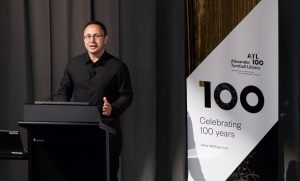
Pro Vice-Chancellor – Pacific, University of Auckland, Damon Salesa presented a powerful summary of a long history of pre-European interaction between Pacific Island peoples, drawing on the earliest reports from Dutch navigators to reinforce anthropological studies of ancient trading patterns and warfare. His talk, entitled “Into Native Seas: Europeans encounter an Indigenous Ocean”, provided a stimulating challenge to the traditional view of European exploration into an “uncharted” South Pacific.
This Founder Lecture, held in the National Library Auditorium, is part of the 80th birthday celebrations of the Friends of the Turnbull Library. It acknowledges the Turnbull Library’s founding benefactor, Alexander Turnbull, who died in Wellington on Friday 28 June 1918.
— — — — — — — — — —
Tuesday 23 July 2019 at 5.30pm: Paddy Richardson
The Greening of the Spring: In search of Otto
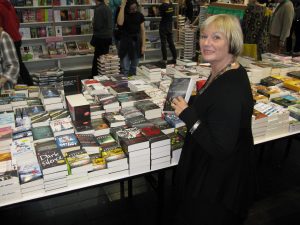 Dunedin novelist Paddy Richardson at the start of her Randell Cottage Residency, spoke to the Friends in conjunction with the Randell Cottage Writers Trust. Paddy is the author of seven novels and two collections of short stories.
Dunedin novelist Paddy Richardson at the start of her Randell Cottage Residency, spoke to the Friends in conjunction with the Randell Cottage Writers Trust. Paddy is the author of seven novels and two collections of short stories.
Paddy’s recent novel, “Through the Lonesome Dark” (Upstart Press, 2017), is set in World War I, and she plans to use her Residency in Wellington to continue work on a sequel, set in New Zealand during WWI, for which she intends to carry out research in the Turnbull Library. Her project tells the story of a fictional young mining activist Otto Bader who is arrested as an ‘enemy alien’ and then incarcerated on Somes Island along with others of Austrian and German origins.
— — — — — — — — — —
Thursday 8 August 2019 at 12.10pm: Dr Therese Lloyd
A special lunchtime session to celebrate New Zealand poetry! Therese Lloyd (shortlisted in the Ockham Book Awards for her book of poetry, “The Facts“) talks about New Zealand poetry that is inspired by New Zealand works of art – a genre known as ‘ekphrastic poetry’. A notable European example, she says, was John Keats’ ‘Ode on a Grecian Urn’. In New Zealand there is the collaborative work of poet Hone Tuwhare and visual artist Ralph Hotere. Therese is researching a proposed anthology of this poetry.
— — — — — — — — — —
Thursday 22 August 2019 at 5.30pm: Dr Oliver Stead
Captain Cook at the Turnbull: New perspectives, original evidence
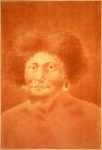
Dr Oliver Stead has been Curator Drawings Paintings & Prints at the Alexander Turnbull Library since October 2015. He is the author of a number of books on New Zealand art.
Image shown at right is by William Hodges (1744-1797); Red chalk on paper 550 x 375 mm. Ref: ATL-G-365
— — — — — — — — — —
Wednesday 11 September 2019 at 5.30 pm: Barbara Francis
Titus Angus White and the Māori Prisoners of War on the ‘Marion’
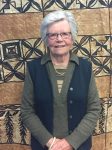
Barbara Francis, writer and researcher, is a former teacher who has become an accomplished researcher at the Turnbull Library. On 11 September, her talk to the Friends presented her latest research topic, the extraordinary story of a colonial public servant, Titus Angus White, who was fluent in te reo and was put in charge of 200 Māori prisoners of war – after the Battle of Rangiriri – on the hulk “Marion” in Waitemata Harbour. A particular focus of the presentation was a photograph in the Turnbull collections of Angus White with an ‘unidentified Māori man’. Barbara found that Angus White had described the photograph in a letter, naming him as Te Tapihana Tiriwa, a leading Ngatai Maniopoto chief who was taken prisoner at Rangiriri.  Te Tapihana Tiriwa was frequently mentioned by Angus in his Daily Reports to the Native Minister and it seems certain that this is who the ‘unidentified Māori man’ is.
Te Tapihana Tiriwa was frequently mentioned by Angus in his Daily Reports to the Native Minister and it seems certain that this is who the ‘unidentified Māori man’ is.
Photograph (left) is Titus Angus White and Te Tapihana Tiriwa July, 1864.
Barbara Francis gave a FoTL talk when she was researching her book on Agnes Moncrieff in China 1930-1945, later published by VUP as “You Do Not Travel in China at the Full Moon”.
— — — — — — — — — —
Tuesday 8 October 2019 at 5.30 pm: Graeme Lay
James Cook and the Art of Exploration: Graeme Lay has written six books based on the life of James Cook, including the best-selling novel trilogy The Secret Life of James Cook, James Cook’s New World and James Cook’s Lost World (HarperCollins).

This talk looked at the legacy of Cook’s voyages and especially the artworks that resulted, the paintings and drawings of artists such as Sydney Parkinson, Tupaia, William Hodges and John Webber.
Tuesday 8 October 2019 marked the very day, 250 years ago, that James Cook’s party first set foot on New Zealand soil. The location was the banks of the Turanganui River, near today’s Gisborne city.
— — — — — — — — — —
Wednesday 23 October 2019 at 5.30 pm: Dame Fiona Kidman
Finders keepers: the making of a collection: 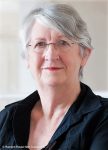 Dame Fiona Kidman is a literary star, a poet and a much-loved author of many award-winning novels.
Dame Fiona Kidman is a literary star, a poet and a much-loved author of many award-winning novels.
She has been using Turnbull resources – and also contributing to them – for nearly fifty years. She says her books such as the historical novels The Captive Wife, The Infinite Air and This Mortal Boy would have been impossible without access to the Turnbull’s amazing collections. Over the years she accumulated a large body of personal correspondence and recordings from literary luminaries, including Dame Ngaio Marsh, Frank Sargeson, Janet Frame, Denis Glover and others, as well as artists, educators and politicians. She describes herself as a hoarder, but this significant body of correspondence, tapes and personal manuscripts has all found its way to the Turnbull. This talk was about the making of a collection.
— — — — — — — — — —
Tuesday 12 November 2019 at 5.30 pm: Nick Bollinger
Revolutions Per Minute: the Counterculture in New Zealand 1960-1975
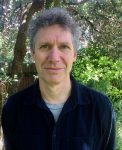 Nick Bollinger is a Wellington freelance writer & researcher. He was awarded a FoTL Research Grant this year, to work on a book chronicling the development of the counterculture in New Zealand 1960-1975. The term counterculture originated in the 1960s and became widely used to identify a collection of groups and individuals broadly sharing a belief in an alternative society. His book will trace the roots of countercultural ideas, showing how these were disseminated in this country, how they intersected and diverged. It will look critically at how these ideas evolved in practice, how some flourished and others failed, and the effect these had on New Zealand society as a whole, at the time and up to the present day. He discussed his research into existing interviews, periodicals, photographs, letters and memoirs;, and his own interviews of key figures.
Nick Bollinger is a Wellington freelance writer & researcher. He was awarded a FoTL Research Grant this year, to work on a book chronicling the development of the counterculture in New Zealand 1960-1975. The term counterculture originated in the 1960s and became widely used to identify a collection of groups and individuals broadly sharing a belief in an alternative society. His book will trace the roots of countercultural ideas, showing how these were disseminated in this country, how they intersected and diverged. It will look critically at how these ideas evolved in practice, how some flourished and others failed, and the effect these had on New Zealand society as a whole, at the time and up to the present day. He discussed his research into existing interviews, periodicals, photographs, letters and memoirs;, and his own interviews of key figures.
— — — — — — — — — —
Tuesday 26 November 2019 at 5.30 pm: Dr Catherine Bishop
Women Mean Business: Colonial businesswomen in New Zealand
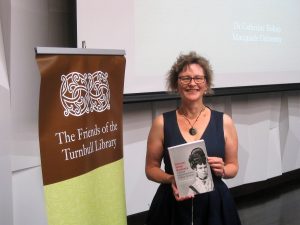 Catherine Bishop is a Sydney-based historian with a particular focus on women. She has a postdoctoral fellowship at Macquarie University (2019-2021) . She has published a number of articles and her first book Minding Her Own Business: Colonial Businesswomen in Sydney was published in Oct 2015. This book was awarded the 2016 Ashurst Business Literature Prize. She is also interested in heritage, particularly in the way women’s history has been memorialised. Her lively talk was well illustrated with entertaining stories from New Zealand’s colonial past.
Catherine Bishop is a Sydney-based historian with a particular focus on women. She has a postdoctoral fellowship at Macquarie University (2019-2021) . She has published a number of articles and her first book Minding Her Own Business: Colonial Businesswomen in Sydney was published in Oct 2015. This book was awarded the 2016 Ashurst Business Literature Prize. She is also interested in heritage, particularly in the way women’s history has been memorialised. Her lively talk was well illustrated with entertaining stories from New Zealand’s colonial past.
Her new book (“Women Mean Business”) on colonial businesswomen in New Zealand was published by Otago University Press in October 2019.
— — — — — — — — — —
Looking back on our public talks, March-November 2018
Tuesday 20 March: Sun, Sea and Sustenance: the story of the Otaki Children’s Health Camp
Reminiscences of 47 former residents and staff of the Otaki Children’s Health Camp have been collected and edited by Di Buchan in a book (published by Steele Roberts) that gives entertaining insights into the health camp movement and celebrates the outstanding individuals who contributed to New Zealand’s first permanent health camp. 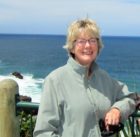 Di Buchan has spent her working life as a social and environmental impact assessor and researcher about projects and programmes throughout New Zealand and the Pacific. She has recently retired and in addition to being a Board member of the Environment Institute of Australia and New Zealand and of the DB Environmental Trust which she established, she is the primary caretaker of a two-acre garden and a family of chooks just down the road from the Otaki Children’s health Camp (now known as Stand Children’s Village).
Di Buchan has spent her working life as a social and environmental impact assessor and researcher about projects and programmes throughout New Zealand and the Pacific. She has recently retired and in addition to being a Board member of the Environment Institute of Australia and New Zealand and of the DB Environmental Trust which she established, she is the primary caretaker of a two-acre garden and a family of chooks just down the road from the Otaki Children’s health Camp (now known as Stand Children’s Village).
— — — — — — — — — —
Thursday 19 April at 5.30pm: Nicolaes Witsen and Abel Tasman’s 1642 voyage of discovery
Nicolaes Witsen (1641-1717) published parts of the journal of Frans Jacobsz Visscher, Tasman’s chief navigator during the voyage. This journal adds surprising and otherwise unknown details including illustrations which add to our understanding and knowledge of the voyage.
Rudiger Mack, teacher, antiquarian bookseller and researcher, has gone back to the original (1705) Dutch-language report of Abel Tasman’s voyage of discovery, and found clear evidence of exactly where in Golden Bay was the fateful first encounter between Māori and Europeans.
Thursday 24 May at 5.30pm: Malcolm Harrison: textile artist
Malcolm Harrison (1941-2007) was a textile artist of extraordinary creative talent, whose work has been collected by most New Zealand galleries and cultural institutions. It is his artworks that soar above Parliament’s Galleria, and the documentation of the often controversial process behind this installation is held by the Alexander Turnbull Library.
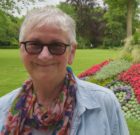 Ann Packer, a freelance writer, editor and oral historian, is planning to write a biography of Malcolm Harrison. She is author of the bestselling Random House book, Crafty Girls’ Road Trip (reprinted twice, new edition in 2012), as well as the prize-wiining book Stitch: New Zealand Textile Artists (2006).
Ann Packer, a freelance writer, editor and oral historian, is planning to write a biography of Malcolm Harrison. She is author of the bestselling Random House book, Crafty Girls’ Road Trip (reprinted twice, new edition in 2012), as well as the prize-wiining book Stitch: New Zealand Textile Artists (2006).
— — — — — — — — — —
Thursday 28 June at 6.00pm: Centenary FOUNDER LECTURE

Professor Lydia Wevers ONZM speaking on BOOKS AND THEIR READERS
Lydia Wevers retired last year after 17 years as Director of the Stout Research Centre at Victoria University of Wellington. She has written and edited many anthologies and books on literary topics and is a well-known literary historian and critic. We are delighted that she has agreed to give this year’s Founder Lecture, which commemorates the 1918 death and bequest of Alexander Horsburgh Turnbull. At Parliament’s Grand Hall, by invitation only.
— — — — — — — — — —
Tuesday 24 July at 5.30pm: Henry Suter: The poverty, despair and discoveries of a colonial naturalist
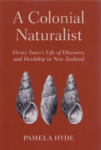 “Henry Suter’s letters and diaries tell an intriguing story of his determination to make a life and living as a naturalist and become New Zealand’s foremost expert on molluscs.” Dr Pamela Hyde has a PhD in medical sociology from Victoria University of Wellington. She is the author of a recently published biography of Henry Suter (1840-1918), who is her great-grandfather. Her research took her to Switzerland and Germany to uncover Suter’s early life. In writing the book she discovered that he had traded in Māori ancestral remains and this led her to participate in a ceremony to repatriate some of these kōiwi tangata at Te Papa in 2017.
“Henry Suter’s letters and diaries tell an intriguing story of his determination to make a life and living as a naturalist and become New Zealand’s foremost expert on molluscs.” Dr Pamela Hyde has a PhD in medical sociology from Victoria University of Wellington. She is the author of a recently published biography of Henry Suter (1840-1918), who is her great-grandfather. Her research took her to Switzerland and Germany to uncover Suter’s early life. In writing the book she discovered that he had traded in Māori ancestral remains and this led her to participate in a ceremony to repatriate some of these kōiwi tangata at Te Papa in 2017.
— — — — — — — — — —
Tuesday 21 August at 5.30pm: William Frederick Howlett BA: Journalist, alpinist, naturalist, teacher
William Howlett arrived in New Zealand in 1875 to begin a peripatetic life as schoolteacher, storekeeper, satirist, alpinist, politician, naturalist and thorn in the side of authority – an articulate, straight talking, intelligent, cynical man generally regarded as a bit odd.
Dr Ian St George is a medical practitioner and amateur historian. He discussed the life of William Howlett, the unusual story of a man who described himself as an “unrestrainable dreamer of dreams”. But the Pahiatua Star saluted his achievments: “There is not another man in the Forty-mile Bush that has done as much as he to bring this district into prominence, by his outspoken and intelligent letters … on the land and other questions.”
— — — — — — — — — —
Thursday 20 September at 5.30pm: Alexander McKay – New Zealand’s first scientific photographer
Simon Nathan , science historian and biographer of Wellington – himself a geologist -has researched the life of Alexander McKay (1841-1917) who explored many parts of New Zealand while working as a fossil collector and geologist for the New Zealand government between 1873 and 1902. Alexander McKay was also a keen amateur photographer, capturing geological features and documenting the impact of the 1888 and 1902 Canterbury earthquakes. He invented a telephoto lens in about 1890, and later developed techniques for photographing fossils and microscopic thin sections of rocks. All of McKay’s varied photographic work was aimed at illustrating the scientific work he was undertaking.
— — — — — — — — — —
Tuesday 16 October at 5.30pm: Two yards of Serge for Mrs Pharazyn: Wellington women go shopping in the 1850s
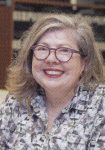 William Clark (1830-1902) was a draper in colonial Wellington, on Lambton Quay. Thanks to the extraordinarily detailed business records which are now part of the manuscript collections of the Alexander Turnbull Library, the shopping habits of his broad variety of customers – Māori and Pākehā, landowners and labourers, sailors and rival shopkeepers, the military and the government – can be revealed. Angela Lassig was delighted to find this treasure trove within the vellum bindings of Mr Clark’s ‘Day’ books while she was researching a book on the history of 19th-century women’s dress in New Zealand – the project for which she has received a FoTL research grant. Angela is a fashion and dress historian currently based in Auckland.
William Clark (1830-1902) was a draper in colonial Wellington, on Lambton Quay. Thanks to the extraordinarily detailed business records which are now part of the manuscript collections of the Alexander Turnbull Library, the shopping habits of his broad variety of customers – Māori and Pākehā, landowners and labourers, sailors and rival shopkeepers, the military and the government – can be revealed. Angela Lassig was delighted to find this treasure trove within the vellum bindings of Mr Clark’s ‘Day’ books while she was researching a book on the history of 19th-century women’s dress in New Zealand – the project for which she has received a FoTL research grant. Angela is a fashion and dress historian currently based in Auckland.
Thursday 22 November at 5.30pm: Defining Conflicts? The New Zealand Wars
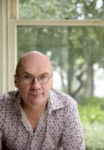 Dr Vincent O’Malley, a well-known and acclaimed Wellington historian whose fine book, The Great War for New Zealand: Waikato 1800-2000 was published by Bridget Williams Books in 2016, has received a FoTL research grant to help him research his latest book project, a history of the New Zealand Wars aimed at the secondary school market. Vincent presented an overview of this turbulent period in our history – a series of conflicts that profoundly shaped the course and direction of our nation’s history. He looked at the origins, causes and consequences of these conflicts and discussed how the wars have been remembered historically.
Dr Vincent O’Malley, a well-known and acclaimed Wellington historian whose fine book, The Great War for New Zealand: Waikato 1800-2000 was published by Bridget Williams Books in 2016, has received a FoTL research grant to help him research his latest book project, a history of the New Zealand Wars aimed at the secondary school market. Vincent presented an overview of this turbulent period in our history – a series of conflicts that profoundly shaped the course and direction of our nation’s history. He looked at the origins, causes and consequences of these conflicts and discussed how the wars have been remembered historically.
— — — — — — — — — —
Looking back at 2017
Thursday 9 February at 5.30pm: Serendipity and Palimpsests: Re-imagining Colenso and his contemporaries
Dr Sydney Shep, co-curator of an exhibition (which closed on 9 March) at Turnbull Gallery titled Unexpected Connections: Colenso and his contemporaries, considered aspects of the multi-layered world of 19th-century polymaths like William Colenso who lived rich, interconnected, transnational lives and who remain challenging figures for biographers and researchers alike.
Wednesday 22 March at 5.30pm: Murder: A New Zealand social history
 Christchurch sociologist Dr Jarrod Gilbert – who received the 2016 FoTL Research Grant – is the author of Patched: The History of Gangs in New Zealand. His talk about his current project, a book titled Murder: A New Zealand History, engaged his audience and provoked lively debate about murder trials and the social climate that surrounds them.
Christchurch sociologist Dr Jarrod Gilbert – who received the 2016 FoTL Research Grant – is the author of Patched: The History of Gangs in New Zealand. His talk about his current project, a book titled Murder: A New Zealand History, engaged his audience and provoked lively debate about murder trials and the social climate that surrounds them.
Tuesday 11 April at 5.30pm: Te Oka — Pakeha Kaumatua: The life of Jock McEwen
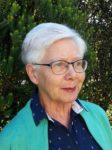 Dr Mary McEwen is a retired ecologist and a writer. She spoke about her biography of Jock McEwen (her father-in-law), giving many insights into the complex nature of this man and his times. Jock McEwen – administrator, historian, linguist, master carver and composer – was a significant figure in New Zealand and the Pacific Islands for more than half a century.
Dr Mary McEwen is a retired ecologist and a writer. She spoke about her biography of Jock McEwen (her father-in-law), giving many insights into the complex nature of this man and his times. Jock McEwen – administrator, historian, linguist, master carver and composer – was a significant figure in New Zealand and the Pacific Islands for more than half a century.
Wednesday 10 May at 5.30pm: Shirley Smith and the Mongrel Mob
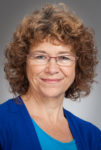
Auckland oral historian and biographer Sarah Gaitanos – the author of biographies of Nola Millar and violinist Clare Galambos Winter – has been working on a biography of the trail-blazing human rights lawyer and activist Shirley Smith. She spoke about Shirley Smith’s own assessment of her legal career, when (reflecting on her life) she suggested that her advocacy for her “boys” in the Mongrel Mob in the 1970s and 1980s was among the most satisfying things she had ever done.
Tuesday 27 June at 6.00pm: The 2017 FOUNDER LECTURE
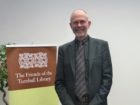
FOOTNOTES TO HISTORY: How does the historian get from footnotes to text? Or vice versa? Wellington historian Malcolm McKinnon gave a lively talk, drawing on his experience researching and writing New Zealand economic history to probe the often unpredictable journey from the archive to the book.
Tuesday 11 July at 6.45pm: From the Kirkcaldie & Stains archives
Following the business of the FoTL AGM, ATL staff members presented several items from the archives of Wellington’s famous department store – including photographs, memorabilia and Kirkcaldies catalogues – now held in the Turnbull collections.
Wāhine: Beyond the ‘Dusky Maiden’:
Two events were held in July and August to present different aspects about the exhibition.
Friday 28 July, at 12.10 and Thursday 10 August at 5.30pm
Ki tua o te puhi rauwhero: Historical representation(s) of Māori women

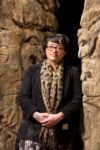
Puawai Cairns, Senior Curator Māori, at Te Papa talked about stories that emerged from her research for Te Papa’s Gallipoli exhibition. She alluded to the invisibility of many Māori women in World War I histories. Paul Diamond, Curator, Māori at the Alexander Turnbull Library, shared cartoons featuring Māori women from his forthcoming book on the representation of Māori in editorial cartoons. Ariana Tikao (right) chaired this event. 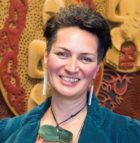
Ariana Tikao and Catherine Bisley, co-curators of the Wāhine: Beyond the ‘dusky maiden’ exhibition, presented the second event, sharing insights relating to powerful examples of mana wahine contrasted with nineteenth-century ideas about Māori maidens.
Wednesday 13 September at 5.30pm: 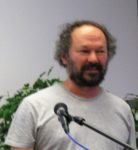 Patrick Hickey (1882-1930): “A dangerous radical”
Patrick Hickey (1882-1930): “A dangerous radical”
Peter Clayworth, historian and researcher (pictured left at the Library in March), spoke about the extraordinary life of Pat Hickey – coal miner, union leader, and socialist who helped found the New Zealand Labour Party – drawing on his biographical research into the early twentieth-century labour activist.
— — — — — — — — — —
Tuesday 10 October at 5.30pm: ‘A democratic game’: Rugby league, community identity and cultural pride in New Zealand between the war years
Recipient of this year’s Friends of Turnbull Library Research Grant, Auckland historian Ryan Bodman discussed some insights from his research into the social and cultural history of rugby league in working-class communities in New Zealand.
Thursday 9 November at 5.30pm: ‘Make her praises heard afar’
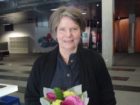 Well-known historian and biographer of Ettie Rout, Jane Tolerton (pictured right) spoke about her research into New Zealand women’s overseas war work in World War I. Noting that New Zealand was the first country in the world to grant women’s suffrage, but only one among the allies not to have produced a book on women in the war, Jane says she has found many great stories that show that “New Zealand women ‘punched above our weight’ in the war”. Much of her research was done in the Turnbull Library. (See Bulletin Board.)
Well-known historian and biographer of Ettie Rout, Jane Tolerton (pictured right) spoke about her research into New Zealand women’s overseas war work in World War I. Noting that New Zealand was the first country in the world to grant women’s suffrage, but only one among the allies not to have produced a book on women in the war, Jane says she has found many great stories that show that “New Zealand women ‘punched above our weight’ in the war”. Much of her research was done in the Turnbull Library. (See Bulletin Board.)
— — — — — — — — — —
Looking back to 2016:
Thursday, 18 February at 5.30pm: Measured Works: Surveying Wellington
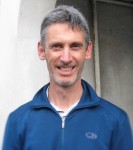 Mark Bagnall, Curator ATL Cartographic Collections, talked about his research for the February exhibition at the Turnbull Gallery.
Mark Bagnall, Curator ATL Cartographic Collections, talked about his research for the February exhibition at the Turnbull Gallery.
The first plans for the settlement of Wellington, drawn up in London in 1839, were probably more marketing-focussed, and gave quite vague directives for early surveyors from 1840 onwards. (Left: Mark Bagnall)
Wednesday, 30 March at 5.30 pm: Mr Explorer Douglas and his giant geological maps of South Westland

Simon Nathan, science historian and biographer of Wellington – himself a geologist – discussed the achievements of Charles Douglas, one of New Zealand’s most accomplished – but least known – explorers, who devoted himself to the detailed exploration and mapping of Westland. Charles Douglas’s map of Westland remains on display on the Lower Ground floor of the National Library of New Zealand, Aitken Street entrance. (Pictured: detail of huge map of South Westland)
Wednesday, 13 April at 5.30 pm: ‘Tinker, Tailor, Soldier, Settler: Garrison and Empire in the 19th century’
Charlotte Macdonald, Wellington historian & university professor, talked about her current research project, which aims at putting a face to the British army and navy presence in colonial New Zealand. Read more about the project on Soldiers of Empire
— — — — — — — — — —
Thursday, 19 May at 5.30 pm: A H Turnbull and ‘that most entertaining little man, Dr Hocken’
Donald Kerr, biographer of the famous NZ collector who lived in Dunedin from 1862 until his death in 1910, spoke on his research. Dr Thomas Hocken was a contemporary of Alexander Turnbull, and accumulated the extraordinary treasures forming the basis of the Hocken Library – now in the University of Otago.
Wednesday 15 June at 6.00pm
The 2016 FOTL Founder Lecture: Moss and Mason: some reflections on writing literary biography
Wellington writer, biographer and historian Rachel Barrowman discussed the research for her acclaimed biographies of RAK Mason and Maurice Gee. Rachel is the author of The Turnbull: a library and its world.
Tuesday 5 July at 6.00pm: The AGM of the Friends of the Turnbull Library
National Librarian Bill Macnaught
Following the business of the AGM, Bill Macnaught talked about the future directions of the National Library of New Zealand / Te Puna Matauranga o Aotearoa, looking ahead to 2020.
Tuesday 23 August at 5.30pm
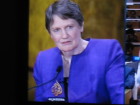
Helen Clark – Secretary-General of the United Nations?
Wellington political analyst and researcher Ken Ross shared some insights from his research on former Prime Minister Helen Clark, who was a contender for the top job at the United Nations in New York.
Tuesday 14 September at 5.30pm
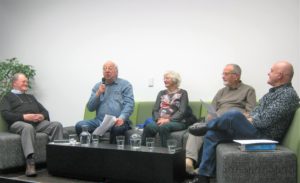
The contribution of Wellington’s Downstage to theatre in New Zealand
In celebration of Heritage Month, a panel discussion chaired by Murray Lynch (Director of Playmarket, former director of Downstage) was held, featuring:
Peter Bland, poet, playwright, co-founder of Downstage; Sunny Amey, former director of Downstage; Bill Sheat, lawyer, co-founder of Downstage; and Laurie Atkinson, recently retired theatre reviewer.
During the lively discussion, Peter Bland recited some of his poems, and all panellists shared stories of Downstage’s early days – from the Wellington Rowing Club to the move after 10 years to the Hannah Playhouse in Courtenay Place. It was a dramatic and entertaining public forum about a significant landmark in Wellington’s cultural life, much appreciated by an audience of about 80.
Tuesday 11 October at 5.30pm
Dr Lydia Wevers, Director of the Stout Research Centre, spoke on Reading TROLLOPE in New Zealand.
— — — — — — — — — —
Looking back to 2015:
Wednesday 4 February at 5.30pm

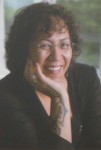
Professor Atholl Anderson and Dr Aroha Harris, described the huge research project that became Tangata Whenua: An Illustrated History, published by Bridget Williams Books in November 2014. New perspectives on Maori history, to commemorate the 175th anniversary of the signing of the Treaty of Waitangi.
Wednesday 11 March at 5.30pm
Once on Chunuk Bair: Cultural artefact of the 1980s?
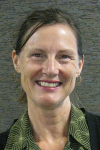
Auckland researcher Lucy Treep, now working on a biography of Maurice Shadbolt, spoke about Shadbolt’s only play, Once on Chunuk Bair. The play dramatises events that occurred on Turkey’s Gallipoli peninsula in August 1915. At the time Shadbolt said that the play was intended to be a ‘monument’ to the men who died at Gallipoli but in 1989 he also suggested that the play was ‘really about New Zealanders and New Zealand seventy years on’ from 1915. Dr Treep is a graduate of the University of Auckland with a degree in architecture and a PhD in English.
Thursday 30 April at 5.30pm
The First World War and the Pacific
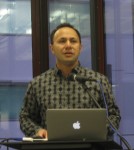
Toeolesulusulu Damon Salesa, Associate Professor of Pacific Studies at the University of Auckland, spoke on Pacific perspectives of the First World War. He stressed that, although it is typically seen as a European war, it was global and imperial, with important dimensions and engagements in the Pacific. Many lasting legacies of the war—for New Zealand, especially—took place much closer to home. For New Zealand, Samoa was where the first act of the war occurred.
Thursday 14 May at 5.30pm
The Future of the Past? Collecting internet and other born digital heritage at the Alexander Turnbull Library
Mark Crookston, Digital Collection Strategy Leader at the ATL, spoke about the born digital and internet collections of the Alexander Turnbull Library, looking back over seven years since the launch of the National Digital Heritage Archive. He discussed aspects of the role the research library of the future in enabling society to understand the past.
Wednesday 17 June at 5.30pm
Ken Ross spoke on David Lange’s ‘diplomatic’ journey from the Oxford Union to Yale

Left: David Lange hosts Paul Eddington (‘Yes Minister’ actor), 28 January 1988.
Ken Ross discussed his assessment of David Lange alongside the trio of our other best prime ministers internationally since 1945 – Norm Kirk, Jim Bolger and Helen Clark. (See Bulletin Board) He concludes that David Lange warrants a biography written by someone with the talent of John Mulgan or Michael King.
Wednesday 22 July at 6.00pm
The 2015 FOTL Founder Lecture
Tales from the digital frontier: Developing Te Ara, the world’s 1st national encyclopedia on web
Wellington writer, digital communicator and historian Jock Phillips spoke on his role in developing and eventually completing the huge online project, Te Ara, Encyclopedia of New Zealand. Jock received the 2014 Prime Minister’s Award for Literary Achievement in Non-fiction. Looking back on the design and development of Te Ara, Jock offered insights into the editing challenges of this enormously successful website, www.TeAra.govt.nz This 2015 Founder Lecture was held at the Aronui lecture room of the Royal Society of New Zealand, Wellington.
Tuesday 4 August at 5.30pm
Tea, Zen and Cosmic Anatomy: The mysticism of Katherine Mansfield
In this FoTL talk, Gerri Kimber explored Katherine Mansfield’s spiritual development during her life, culminating in her decision to enter Gurdjieff’s ‘Institute for the Harmonious Development of Man’ in Fontainebleau in the autumn of 1922, claiming that ‘I want to be all that I am capable of becoming so that I may be – […] a child of the sun’. Gerri Kimber is Senior Lecturer in English at the University of Northampton, and Chair of the international Katherine Mansfield Society. Gerri is the recipient of the Friends of Turnbull Library Research Grant for 2015.
Tuesday 8 September at 5.30pm
New Zealand Publishing Today
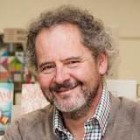
Wellington publisher Fergus Barrowman MNZM discussed aspects of New Zealand publishing from his perspective of 30 years as Publisher of Victoria University Press.
Fergus is a literary commentator and is editor of the literary journal Sport, which he co-founded in 1988 with Elizabeth Knox, Damien Wilkins and Nigel Cox. Fergus was awarded the NZ Order of Merit for services to publishing, in June 2014.
Tuesday 8 September at 5.30pm
The Rona: a significant historical racing yacht
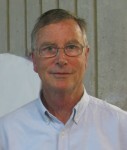 Peter Scott, a former National Librarian, came along with Philippa Durkin, from the Rona Preservation Trust to talk about the preservation and conservation of a very special old lady: the classic kauri racing yacht Rona which was built in 1892 for wealthy merchant and benefactor Alexander Turnbull. The Rona has continued to sail and be raced but she does need more work now.
Peter Scott, a former National Librarian, came along with Philippa Durkin, from the Rona Preservation Trust to talk about the preservation and conservation of a very special old lady: the classic kauri racing yacht Rona which was built in 1892 for wealthy merchant and benefactor Alexander Turnbull. The Rona has continued to sail and be raced but she does need more work now.
Peter Scott is particularly interested in the history of the Rona, and is currently chairing the fund-raising sub-committee for the deck restoration project.
Tuesday 10 November at 5.30pm
You Don’t Travel in China at the Full Moon: Agnes Moncrieff and China, 1930-1945
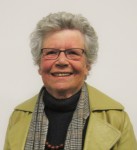
Wellington researcher and former teacher Barbara Francis (pictured) discussed Nessie Moncrieff’s life in China. Agnes ‘Nessie’ Moncrieff had an interesting life. She graduated MA from Victoria University College and represented NZ at a World Student Christian Federation Conference in Beijing in 1922. After three years as a Travelling Secretary for the NZ Student Christian Movement and four years teaching at Feilding Agricultural High School, she trained with the NZ YWCA in order to return to China in 1930 as an International Secretary with the YWCA of China until 1945. She wrote weekly letters to family and friends and monthly reports to NZ YWCA during these 15 years in China, covering her involvement with YWCA and her experiences in China.
Thursday 19 November at 5.30pm
The Maori Land March forty years on …
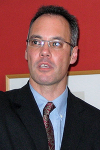
Paul Diamond, Curator Maori at the Alexander Turnbull Library, spoke about the exhibition (showing until 4 December 2015) in the Turnbull Gallery, “Not One More Acre”, commemorating the 40th anniversary of the Maori Land March – which set off from Te Hapua to march to Wellington in 1975. The impact of the march has been far-reaching, and the images of Dame Whina Cooper and her mokopuna quickly reached iconic status.
— — — — — — — — — —
All public lectures are free, although donations are welcome.
